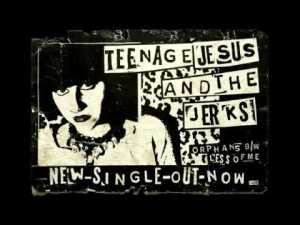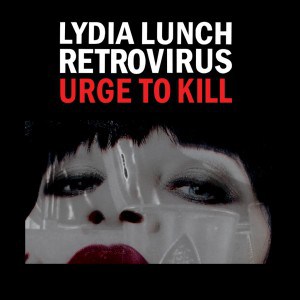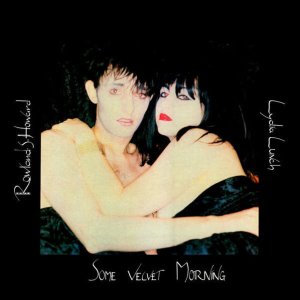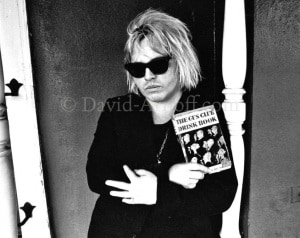Lydia Lunch: Pleasure Is The Only Rebellion (Interview)
Lydia Lunch is many things…musician, poet, conceptualist, photographer…basically a walking work of art. Lydia was at the cutting edge of New York City’s No Wave movement when her band Teenage Jesus & The Jerks first began recording and performing in the late 1970s. She’s never stopped creating, working with the likes of Thurston Moore, Robert Quine, Rowland S Howard and Jeffrey Lee Pierce along the way. She’s just opened a retrospective exhibit in New York titled, Lydia Lunch: So Real It Hurts and released a new album with her band Retrovirus titled Urge To Kill. Lydia and her band, featuring original Sonic Youth drummer Bob Bert, revisit some of her classic tunes along with a few of her old favourites. The 13th Floor’s Marty Duda spoke to Lydia about the new album and about her time working with Jeffrey Lee Pierce and Rowland S Howard. But first, the subject of political action came up. Both Marty and Lydia hail from Rochester, New York, and both experienced, firsthand the race riots of the mid-1960s that took place in Rochester and in many other American cities. Which brings us to the topic of contemporary political protest…
Listen to the interview with Lydia Lunch here:
LL: I think that spirit of protest somehow embedded itself for me and just this Sunday I was in the recording studio with Umar Bin Hassan of The Last Poets. You know who they are? This Is Madness, The Revolution Will Not Be Televised.
MD: Oh absolutely, yeah.
LL: One of my heroes. This was second time I was in the studio with him and it was quite fantastic. So went full circle, here we are now.
MD: Yup. It looks like that kind of uprising is happening again over there.
LL: Well not enough if you ask me.
MD: Yeah I agree actually. I was having a discussion with someone the other day about it and I kind of was telling him, I said I wouldn’t be surprised if it just goes off over there, the mood that is…
LL: Well I mean there’s, obviously there’s any number of ways since the original riots of 64’, 67’ the government has infiltrated and shut down protest movements over and over again by incarcerating people or infiltrating or massive surveillance or whatever but I really think the situation’s at critical mass right now as far as injustice, inequality and mass murder on the part of the government.
MD: Yup. It will be interesting to see what happens next, I mean you don’t want bad things to happen to people, but at the same time something needs to happen.
LL: Well, you know, in my theory, it’s the same thugs and savages that bankrupt entire nations, that loot entire countries, that massacre by the millions complain when people break a drugstore window and steal some god-damn pampers.
MD: Right, exactly.
LL: I was shocked. I mean, I always like to say, one death, oh it’s a tragedy, one million, merely a statistic.
MD: Yup, it seems that way.
LL: And a million people in Barcelona protested one of the later Iraqi wars but what good does that do with the corporate cabal that owns and controls everything, in other words the same people that destroy are paid to rebuild but don’t. What Is a million protesting mean? Nothing.
MD: Yeah.
LL: At this point and that’s the sad reality. That’s why I have rock music. Get away from all that occasionally!
MD: Exactly. So you got a retrospective happening in New York City, is that right?
LL: Well I have an art exhibit happening and part of it is a retrospective and part of it is archival posters like old fashion poster wall, like when we used to be able to post posters rip them down and put them up again.
MD: Right.
LL: There’s some framed posters and archival ephemera. I have an installation called you are not safe in your own home which is like a private trauma zone, like the battle of the sexes, a destroyed bedroom with the pornography and poetry from the last maniac I endeavoured, you know, genius and maniac being so close together, and then the main thing is the photo exhibition called The War Is Never Over having to…feeling as If I’m the last woman on the mountain with the bull horns screaming about this political stuff which I’ve been screaming about since Ronald Reagan. I had to find a new language and that language became photography and what that photography consists off is photo montages. For instance like a child’s face with a piece of Belchite which was a Spanish civil war village that Franco bombed in 1936, eliminating 6000 of his own people. So I would use as the children’s flesh a piece of bloody wall or my face but the flashes of a camouflaged solider with a machine gun. So I had to find a new language to speak about war because, well it doesn’t stop and I’m not going to stop talking about it.
MD: Right.
LL: Hence we must rock.
MD: Exactly. Is it weird for you to kind of look back on your career? I mean, you don’t seem to be the kind of person that’s nostalgic or sentimental.
LL: Not at all. It was interesting is this, I’ve been compiling my archives for the past year and a half which are ridiculously extensive. I mean for some reason from the age of 17 I knew I just had to, I was shitting in the face of history is I think is what I do.
MD: Right.
 LL: I was able to document every, especially musical concept…I was really big on documentation. Series I would curate, letters from people all my recordings, all the writing and I’m trying to unload it to a university so that they can digitalize it before, I don’t want to leave this task to anybody else so I’m doing that. What’s interesting is as a contrarian and somebody who’s always moving forward though, basically I see myself as a conceptualist, and if I have a musical concept I always, the concept comes first and the collaborators come second and with Retrovirus I mean I just love the name, it’s a retrospective. It is a viral contaminant, kind of like anti-homeopathy which I hope like cures like, that minority of people much like myself who are dissatisfied, angry, yet somehow strangely hedonistic and Utopian at the end of the day because pleasure is the only rebellion. It just made sense at this point when there’s such little hard, aggressive rock especially with females fronting it, to do this.
LL: I was able to document every, especially musical concept…I was really big on documentation. Series I would curate, letters from people all my recordings, all the writing and I’m trying to unload it to a university so that they can digitalize it before, I don’t want to leave this task to anybody else so I’m doing that. What’s interesting is as a contrarian and somebody who’s always moving forward though, basically I see myself as a conceptualist, and if I have a musical concept I always, the concept comes first and the collaborators come second and with Retrovirus I mean I just love the name, it’s a retrospective. It is a viral contaminant, kind of like anti-homeopathy which I hope like cures like, that minority of people much like myself who are dissatisfied, angry, yet somehow strangely hedonistic and Utopian at the end of the day because pleasure is the only rebellion. It just made sense at this point when there’s such little hard, aggressive rock especially with females fronting it, to do this.
MD: Right.
LL: And it’s very exciting. I mean Bob Bert, ex of Sonic Youth, Pussy Galore, he’s one of my oldest friends and has seen more of my shows than any man alive and when the opportunity came to stage Retrovirus, I contacted him first and then Weasel Walter, who’s a master improvisational composer, drummer, guitar player, he actually volunteered because I was kind of stumped. Who can you get on guitar to cover Rowland S. Howard or Teenage Jesus or 8-Eyed Spy and Bob Quine all in one go?
MD Right.
LL: And he volunteered and perfect man for the job and then he brought in Tim Dahl who’s the latest addition on bass who just really brings another sort of just psychotic intensity to the mix. So it’s really been fun, I mean a lot of these songs have never been done live because the point was to document and I didn’t always tour the music I did because there’s just no point. So it’s exciting for me as contrarian to also, and it’s also kind of painful in some ways, just remembering where I was at at those times, how much physical pain I’ve always been in which comes out in a lot of the lyrics.
MD: Yeah.
LL: Not to mention the psychological insight. Anyway we’re dealing with the trauma zone here and I’m just trying to be the voice for those that haven’t found the words yet to articulate the frustration and existential crisis of life yet still hold out that gold at the end of the night if not at the end of the rainbow.
 MD: So did you…going back and re-recording these tunes that you had recorded 30 years ago…did you find out anything new about the songs or about yourself or when you listened to them and reworked them, was there something you wanted to accomplish with redoing them?
MD: So did you…going back and re-recording these tunes that you had recorded 30 years ago…did you find out anything new about the songs or about yourself or when you listened to them and reworked them, was there something you wanted to accomplish with redoing them?
LL: Well, it’s interesting because I mean, I think that most, all of my concepts have been have been extremely successful. Somehow all the original recordings are as they should be. We didn’t do much except for just, you know, we know more now. We could add a bit of intensity, we’re better musicians, well they’re better musicians. So I think it’s just bringing new life to the same situation. It was interesting doing 8 Eyed Spy again which was a band I never, which was popular but was not my favourite, was actually the least favourite thing I’ve ever done, people liked it because it was catchy.
MD: Right.
LL: I hated it because it was catchy.
MD: Right.
LL: But reworking some of it as it was but adding a new intensity, it’s quite shocking to me the influences there which is so kind of west coast Jazz, Punk fusion. So yeah, it’s very interesting. These musicians are so stellar, we have such a good time and basically it’s, as all my work is in some sense, a duty that I have to, it’s a duty, it’s a calling and I like it more than I ever have.
MD: And I see you cover a Rowland Howard tune… Still Burning.
Click here to listen to Still Burning from Urge To Kill:
LL: Yeah.
MD: Obviously down here in New Zealand, he’s the man. There’s a retrospective that has just come out of his called Six Strings That Drew Blood.
LL: Yeah.
MD: Your recording of Some Velvet Morning is on with him. For folks down here, maybe you could just talk a little bit about what kind of relationship you had with him and what kind of…?
 LL: I was living in L.A when I first heard Prayers On Fire and Junkyard. I don’t know I guess both had already come out and I was going to see him, and of course there were 20 people there, like there were for all of our shows at that time and they hadn’t really broke anywhere yet, they still hadn’t really gotten as big as would in the UK yet and I just walked directly up to Rowland Howard and said I’m a huge fan and he knew my material. He knew Queen Of Siam, he knew Teenage Jesus, and I said what can we do and he immediately proposed Lee Hazlewood which nobody really knew at the time Lee Hazlewood.
LL: I was living in L.A when I first heard Prayers On Fire and Junkyard. I don’t know I guess both had already come out and I was going to see him, and of course there were 20 people there, like there were for all of our shows at that time and they hadn’t really broke anywhere yet, they still hadn’t really gotten as big as would in the UK yet and I just walked directly up to Rowland Howard and said I’m a huge fan and he knew my material. He knew Queen Of Siam, he knew Teenage Jesus, and I said what can we do and he immediately proposed Lee Hazlewood which nobody really knew at the time Lee Hazlewood.
MD: Right.
LL: I mean I knew who Lee Hazlewood was because of 8 Eyed Spy and I had already covered like some Lee Hazlewood songs. So just upon first meeting, Rowland and I formed quite an incredible bond and I said well I’m moving to London to work with you. I moved to London and then he went on tour for months, that’s alright I waited, they came back and Rowland and I just began working together and the first thing was Some Velvet Morning, the EP and then we did an album that actually had disappeared for about 8 years that, that, I don’t know, somehow was held hostage or the tapes were lost, it was called Honeymoon In Red and Nick Cave is on that and Tracy Pew and that came out many years later. So I lived in London for about 2 years and I’d go out on tour with The Birthday Party and Rowland and I started doing like 10 minute improvisational guitar and vocals stuff and then I moved back to New York and eventually moved to New Orleans and many years, this is like I guess 8 or more years after I met Rowland, I was living in New Orleans and of course you’re in New Orleans, you want to do something swampy blues and you think of that concept and Rowland comes to mind. So I somehow gathered the money, I don’t even know how, to bring him down there and we did our album, Shotgun Wedding. Rowland was one of the most, sweet, funny, people don’t know that, very funny, intelligent, kind, talented, I mean his style was so ethereal. What was beautiful about him, which so many musicians don’t get and it’s the difficulty in music is, to know where the space is. Like in spoken word, I’m doing it now just to prove something as I talk. The space, the pause is where the impact is and his guitar playing knew what space was all about, knew that in those pauses, you don’t have to over-do but every note has to count. Like every word doesn’t necessarily have to count but every pause does. So I really love that about his guitar playing. He was not that prolific but every song was urgent.
MD: Yeah.
LL: And I miss him terribly and it’s painful to, it was very painful to do that song and, but I felt as if he was dying from the minute I met him, I mean he was just someone not long for this earth, he was too fragile, too sensitive and too physically ill. So I’m very thankful to have the time I had with him and beautiful songs came from it.
MD: And the other person that you’ve been kind of working on kind of keeping alive is Jeffrey Lee Pierce and the Sessions Project. I read somewhere that there’s another one in progress. Do you know anything about that?
 LL: Theres been many, there’s been so many I can’t keep count and that’s an interesting story because I was approached by Cypress Grove who’s the producer and the master of all these Jeffrey Lee Pierce tribute records. I was approached by him a few years ago, I was living in Spain, and that’s where Jim Sclavunos who was in many of my early bands, Teenage Jesus, 8 Eyed Spy, In Limbo and various other things and now works with Nick Cave in Grinderman. Cypress Grove had found a cassette, he had done Jeffrey’s last tour with him, when Jeffrey was in very bad shape, right before he died and I don’t know how he put up with that but he did. So years later he finds a cassette, Cypress Grove, just called JLP (Jeffrey Lee Pierce) and it was unreleased songs. So he contacted me when they were doing the first one to see if I wanted to cover and so I covered 2 songs, really beautiful and they were just scratches of songs, a lot of this material. People really had to go in and invent the song from a scrap. So I did 2 songs with Cypress Grove, hadn’t met him, we did this over Garage Band and over line, over the internet, and then we just… I would send him on a wild goose chase and say why don’t you go listen to When The Levee Breaks, the original version that Led Zeppelin stole it from and write me a song similar but not really. Or go listen to this Bluegrass song and just get the vibe. So he started sending me songs whenever I had an idea of what I wanted, what direction and they were perfect songs and I would do the lyrics 10 minutes, send them back…this song is a swampy blues, this is desert blues. I still hadn’t met Cypress Grove and we had quite a few songs. One day I just said, I want to send this out if anybody wants to put it out. It took quite a while to get this project out because we just took our time in writing songs over the internet and I’d never met him. So we had about 10 songs and I said what’s your publishing details, I just want to send this out, I want to get some…. and he said he had never written a song before. I really almost fell off my chair, I felt like I went home with a bartender and woke up with Ted Bundy.
LL: Theres been many, there’s been so many I can’t keep count and that’s an interesting story because I was approached by Cypress Grove who’s the producer and the master of all these Jeffrey Lee Pierce tribute records. I was approached by him a few years ago, I was living in Spain, and that’s where Jim Sclavunos who was in many of my early bands, Teenage Jesus, 8 Eyed Spy, In Limbo and various other things and now works with Nick Cave in Grinderman. Cypress Grove had found a cassette, he had done Jeffrey’s last tour with him, when Jeffrey was in very bad shape, right before he died and I don’t know how he put up with that but he did. So years later he finds a cassette, Cypress Grove, just called JLP (Jeffrey Lee Pierce) and it was unreleased songs. So he contacted me when they were doing the first one to see if I wanted to cover and so I covered 2 songs, really beautiful and they were just scratches of songs, a lot of this material. People really had to go in and invent the song from a scrap. So I did 2 songs with Cypress Grove, hadn’t met him, we did this over Garage Band and over line, over the internet, and then we just… I would send him on a wild goose chase and say why don’t you go listen to When The Levee Breaks, the original version that Led Zeppelin stole it from and write me a song similar but not really. Or go listen to this Bluegrass song and just get the vibe. So he started sending me songs whenever I had an idea of what I wanted, what direction and they were perfect songs and I would do the lyrics 10 minutes, send them back…this song is a swampy blues, this is desert blues. I still hadn’t met Cypress Grove and we had quite a few songs. One day I just said, I want to send this out if anybody wants to put it out. It took quite a while to get this project out because we just took our time in writing songs over the internet and I’d never met him. So we had about 10 songs and I said what’s your publishing details, I just want to send this out, I want to get some…. and he said he had never written a song before. I really almost fell off my chair, I felt like I went home with a bartender and woke up with Ted Bundy.
Click here to listen to The Brink by Lydia Lunch from The Jeffrey Lee Pierce Sessions Project:
MD: Oh geez.
LL: I felt creeped out, what do you mean you never wrote a song before and you’ve just sent me 10 perfect songs. I was shocked and a bit weirded out and then we met and then we just continued recording. You know he’s got such a classic…it’s very hard to write classic music, classic rock, I mean especially when you’re humbly alternative as I am. Cypress Grove was just able to bring out what I call my inner Bobby Gentry. So that was a really great project, and it continues, we just keep going now. When we have an idea we write a song. We do a few shows together and sometimes just the two of us, sometimes with James Johnston and Leo from Gallon Drunk also Big Sexy Noise. So yeah, I mean it’s just another side of me, I call it like the Sunday afternoon record and it’s just another, and basically all the songs are written about one heartbreak that went on for a very long time.
That’s Part One of The 13th Floor interview with Lydia Lunch. Click here for Part Two. Lydia Lunch and her band Retrovirus will perform in New Zealand this August. Click here for details.
- Challengers – Dir: Luca Guadagnino (Film Review) - April 24, 2024
- Civil War – Dir: Alex Garland (Film Review) - April 9, 2024
- Pearl Jam – Dark Matter (Monkeywrench/Republic) Album Review - April 1, 2024
